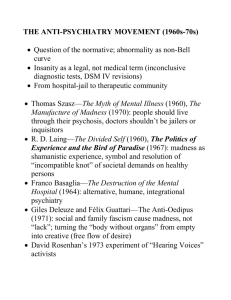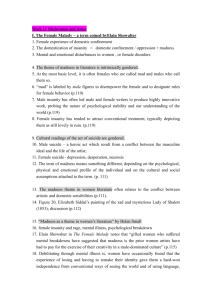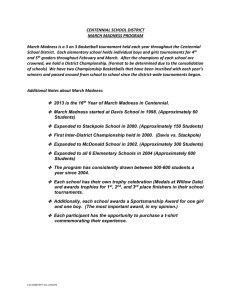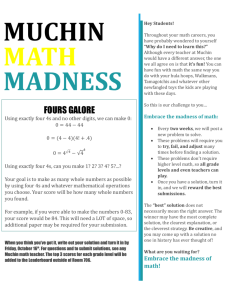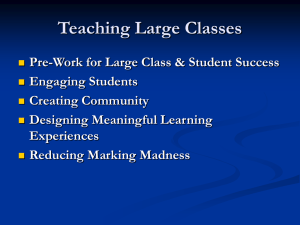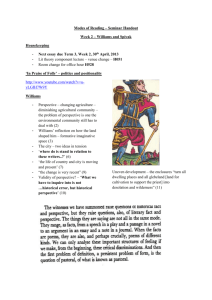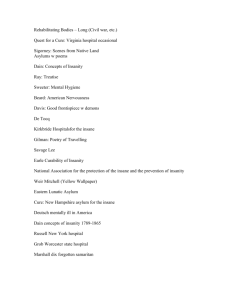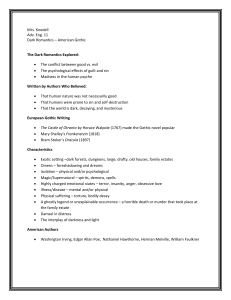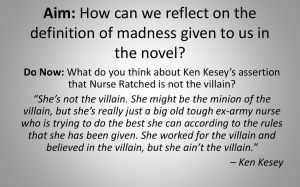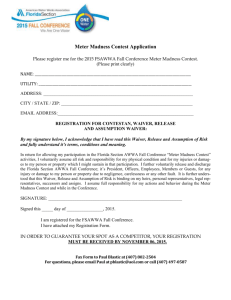Am Gothic syllabus
advertisement
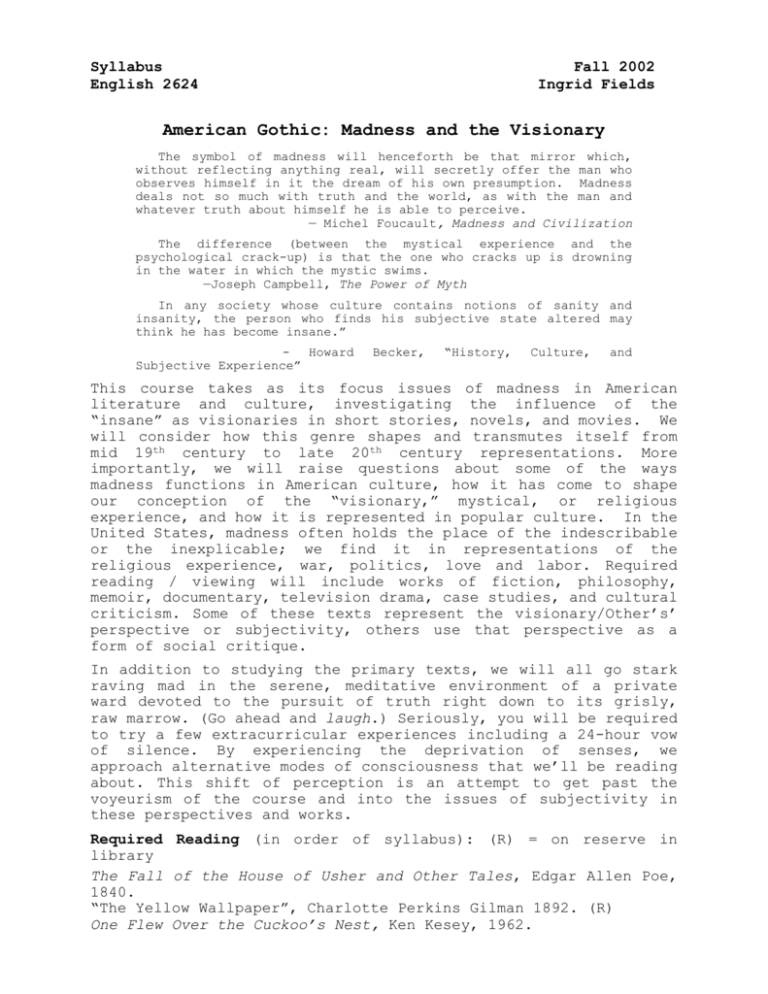
Syllabus English 2624 Fall 2002 Ingrid Fields American Gothic: Madness and the Visionary The symbol of madness will henceforth be that mirror which, without reflecting anything real, will secretly offer the man who observes himself in it the dream of his own presumption. Madness deals not so much with truth and the world, as with the man and whatever truth about himself he is able to perceive. — Michel Foucault, Madness and Civilization The difference (between the mystical experience and the psychological crack-up) is that the one who cracks up is drowning in the water in which the mystic swims. —Joseph Campbell, The Power of Myth In any society whose culture contains notions of sanity and insanity, the person who finds his subjective state altered may think he has become insane.” Howard Subjective Experience” Becker, “History, Culture, and This course takes as its focus issues of madness in American literature and culture, investigating the influence of the “insane” as visionaries in short stories, novels, and movies. We will consider how this genre shapes and transmutes itself from mid 19th century to late 20th century representations. More importantly, we will raise questions about some of the ways madness functions in American culture, how it has come to shape our conception of the “visionary,” mystical, or religious experience, and how it is represented in popular culture. In the United States, madness often holds the place of the indescribable or the inexplicable; we find it in representations of the religious experience, war, politics, love and labor. Required reading / viewing will include works of fiction, philosophy, memoir, documentary, television drama, case studies, and cultural criticism. Some of these texts represent the visionary/Other’s’ perspective or subjectivity, others use that perspective as a form of social critique. In addition to studying the primary texts, we will all go stark raving mad in the serene, meditative environment of a private ward devoted to the pursuit of truth right down to its grisly, raw marrow. (Go ahead and laugh.) Seriously, you will be required to try a few extracurricular experiences including a 24-hour vow of silence. By experiencing the deprivation of senses, we approach alternative modes of consciousness that we’ll be reading about. This shift of perception is an attempt to get past the voyeurism of the course and into the issues of subjectivity in these perspectives and works. Required Reading (in order of syllabus): (R) = on reserve in library The Fall of the House of Usher and Other Tales, Edgar Allen Poe, 1840. “The Yellow Wallpaper”, Charlotte Perkins Gilman 1892. (R) One Flew Over the Cuckoo’s Nest, Ken Kesey, 1962. “Stultifera Navis,” Madness and Civilization: A History of Insanity in the Age of Reason, Michel Foucault, 1965. (R) Arkham Asylum: A Serious House on Serious Earth, Grant Morrison & Dave McKean, 1988. Tarot Information (file on R) “The Encyclopedia of Insanity: a Psychiatric Handbook Lists a Madness for Everyone,” L.J. Davis & Letters to the Editor in response, 1997. (R) “Foreword,” & “The Structure and Dynamics of the Psyche,” Psychology and the Occult, Carl Jung, 1919. (R) Woman on the Edge of Time, Marge Piercy, 1976. The Violent Bear it Away , Flannery O’Connor, 1960. “The Journey Inward,” The Power of Myth, Joseph Campbell, 1988 (R) “Mysticism,” The Varieties of Religious Experience, William James, 1902 (R) “Marjoe Gortner,” Flo Conway and Jim Siegelman, 1978 (R) “Do Drugs Have Religious Import?” Huston Smith, 1964 (R) Campbell excerpt, pp. 13-14 from “Myth and the Modern World” “Psychedelic Society,” Terrance McKenna (R) “The Nitrous Oxide Philosopher,” Dmitiri Tymoczko (R) or http://www.theatlantic.com/issues/96may/nitrous/nitrous.htm and the Modern World” “This is your Brain on God, Jack Hitt (R) The Doors of Perception, Aldous Huxley, 1954. “Psychedelics in the Twentieth Century,” Grinspoon and Bakalar, 1979. (R) “Preface,” also pp. 46-9, and chapters 1 & 2, from Fire in the Brain: Clinical Tales of Hallucination, Ronald K. Siegel, 1992. (R) Viewing: (unless listed otherwise, DVD — all on reserve for use in library only) The Rapture, Michael Tolkin, 1991. (100 min.) Marjoe, Sarah Kernochan & Howard Smith, 1972. (video ,88 min.) “Clyde Bruckman's Final Repose,” X Files, Chris Carter & Darin Morgan, 1995 (video, 50 min.) Erowid website: http://www.erowid.org/index.shtml Mulholland Drive, David Lynch, 2001 (145 min) Apocalypse Now, Francis Ford Coppola, 1979. (153 min.) Assignments: All writing for this course should be based on careful analytical inquiry (thesis, key observations and evidence, development: the “so what?” question, conclusion). • Reading/Viewing Analyses: three well-developed reading/viewing analyses. These are three-page mini-papers, formal writing (thesis, development, conclusions), potentially including one on your extra-curricular experience(s). The analyses are where you practice formal, analytical writing. They will be graded individually. • Two of the analyses topics are assigned in the syllabus, one is a research-based analysis of your own choice (assignment sheet to follow). • Midterm Exam – an in-class essay. • Final Essay: an 8-10 page analytical essay that argues a position on the issues we explore. • You will also be required to present your final essay argument in brief (3-5 min summary) in the last two weeks. This will be part of the participation grade. • Reading Quizzes – part of the participation grade. Participation: Attendance is essential to the seminar—much of what we do transpires in discussion. Excessive absences (more than three) will seriously affect your grade. The baseline expectation here is that you will have read thoroughly and thoughtfully, and that you will reread, write about the reading, and consider discussion questions prior to seminar. Failure to do this will affect your performance in the class. Without class preparation, we will all be miserable, staring at each other when we could be having fascinating discussions. And that might drive us all mad. Grading: Reading/Viewing Analyses 10% each/30%, Midterm Exam 20%, Final Essay 35%, Participation (includes quizzes and presentation) 15%. Office Hours: (HH 221) – I look forward to meeting with you about discussion, readings/viewings, class ideas, and your work. Please make an appointment in advance on the sign-up sheet on my office door. Phone: 8164, but the best way to reach me is by email: ifields@transy.edu. Reading / Screening Schedule Screenings are to be done in the library, outside class time. Extra-curricular: Requirements: meditation, vow of silence Options: fasting, solitude (taking a day(s) away from any social/public space, to be alone, meditate, be silent, etc.). See Vision Quest Handout The Asylum: Madness Contained W Sept 4: Introduction: Madness and Insight - Handout F 6: Poe, “The Fall of the House of Usher” • start reading Kesey M 9: Perkins-Gilman, “The Yellow Wallpaper” (R) W 11: Kesey, One Flew Over the Cuckoo’s Nest (through page190) F 13: Kesey, finish the novel • Required: 24 hour vow of silence sometime this weekend! • start reading Morrison/McKean M 16: Kesey & In Class Writing on Silence W 18: Foucault, “Stultifera Navis,” Madness and Civilization: A History of Insanity in the Age of Reason (R) & Lupack handout F 20: L.J. Davis, “The Encyclopedia of Insanity: a Psychiatric Handbook Lists a Madness for Everyone” & the Letters to the Editor in response (R) • Analysis #1 due – Kesey M 23: Carl Jung, “Foreword,” & “The Structure and Dynamics of the Psyche,” from Psychology and the Occult (R) W 25: Morrison/McKean, Arkham Asylum: A Serious House on Serious Earth – Introduction copy and read Tarot information (R) F 27: Morrison/McKean • Start reading Piercy M 30: Morrison/McKean W Oct 2: Morrison/McKean Psychics & Paranormal Perception Required: Meditation this week F 4: Piercy, Woman on the Edge of Time (through chp. 5) M 7: Piercy, (through chp. 10) W 9: Exam preparation F 11: In-Class Midterm Exam M 14: Fall Holiday W 16: Piercy – finish novel F 18: Piercy • View “Clyde Bruckman's Final Repose” for Monday M 21: Carter & Morgan, “Clyde Bruckman's Final Repose (R) Religion: Prophets, Visionaries, and Faith W 23: O’Connor, The Violent Bear it Away - part 2 F 25: O’Connor – finish novel M 28: O’Connor W 30: O’Connor • Analysis #2 due: focus on any reading to date, may include other texts as well. F Nov 1: James, “Mysticism,” The Varieties of Religious Experience & Campbell, “The Journey Inward,” The Power of Myth (R) • View both The Rapture and Marjoe for next week M 4: Tolkin, The Rapture (R) W 6: Kernochan & Smith, Marjoe (R); read “Marjoe Gortner,” Flo Conway and Jim Siegelman, 1978 (R) F 8: Hitt, “This is Your Brain Society,” Terrance McKenna (R), on God” (R), “Psychedelic & Campbell excerpt, pp. 13-14 from “Myth and the Modern World” (R) • Analysis #3 due – research topic M 11: Smith, “Do Drugs Have Religious Import?” (R), & Tymoczko, “The Nitrous Oxide Philosopher” (R) or http://www.theatlantic.com/issues/96may/nitrous/nitrous.htm Other Perspectives: Drugs, Dreams, and Visions W 13: Huxley, The Doors of Perception F 15: skim Grinspoon and Bakalar “Psychedelics in the Twentieth Century” (R) and view the Erowid site on psychedelics: http://www.erowid.org/index.shtml • View Mulholland Drive for Wednesday M 18: Siegel, readings from Fire in the Brain: Clinical Tales of Hallucination (R) W 20: Lynch, Mulholland Drive • View Apocalypse Now F 22: Coppola, Apocalypse Now (1979) (R) Final Essay due M 25: Student presentations W 27: Student presentations Thanksgiving Holiday M Dec 2: Student presentations Wed 4: Discussion F 6: Conclusions, Evaluations, etc. Related Reading (FYI) Literature / Film: Fax Bahr, George Hickenlooper, and Eleanor Coppola Hearts of Darkness: A Filmmaker’s Apocalypse (documentary about the making of AN) Lewis Carroll, Alice in Wonderland (background for Arkham Asylum) Henry James, The Turn of the Screw Terry Gilliam, Fear and Loathing in Las Vegas, 1997 Tony Kushner, Angels in America: Millennium Approaches & Perestroika (2 part play) David Lynch, Twin Peaks: Fire Walk With Me (film) Arthur Miller, The Crucible (play) Marsha Norman, ‘night, Mother Jonathan Lethem, The Vintage Book of Amnesia Sam Raimi, The Gift, (film) J.D. Salinger, Franny and Zooey TV Series American Gothic, produced by Sam Raimi and Rob Tapert (1995). See: http://www.scifi.com/americangothic/ Theoretical: File (R): Mysticism: Vision Quests – American Indian Narratives Howard Becker, “History, Culture, and Subjective Experience,” Journal of Health and Social Behavior, 1967. Peter Berger, The Sacred Canopy: Elements of a Sociological Theory of Religion. (general resource) Fred Botting, Gothic (The New Critical Idiom) (Routledge, 1996). Joseph Campell, The Power of Myth (Doubleday, 1988). (general resource) Flo Conway & Jim Siegelman, “Marjoe Gortner,” Snapping: America’s Epidemic of Sudden Personality Change, 1978 URL: http://www.positiveatheism.org/hist/marjoe.htm Martin Davies and Max Coltheart, Introduction, Pathologies of Belief (Blackwell, 2000). (general resource) R.A. Durr, Poetic Vision and the Psychedelic Experience. Syracuse University Press, 1970. Michel Foucault, Civilization and Madness: A History of Insanity in the Age of Reason (Random House, 1965). Teresa A. Goddu, Gothic America: Narrative, History, and Nation (Columbia UP, 1997) William James, The Varieties of Religious Experience (Harvard U., 1902). (general resource) Theodore Kaczinski, The Unabomber Manifesto: Industrial Society & Its Future http://www.panix.com/~clays/Una/ Timothy Leary, Flashbacks: An Autobiography. Los Angeles, P.J. Tarcher, 1983. Barbara Tepa Lupack, Insanity as Redemption in Contemporary American Fiction: Inmates Running the Asylum (U. Press of Florida, 1995). Richard Reynolds, Super Heroes: A Modern Mythology (U. Press of Mississippi, 1994). Donald Ringe, American Gothic: Imagination and Reason in Nineteenth-Century Fiction (U. Kentucky Press, 1982). Ronald K. Siegel, Fire on the Brain: Clinical Tales of Hallucination Anna Sonser, A Passion for Consumption: The Gothic Novel in America. Peter Stafford, Psychedelics Encyclopedia, Berkeley, CA: Ronin, 1992. Jay Stevens, Storming Heaven: LSD and the American Dream. New York: Harper and Row, 1988. For a traditional look at the gothic in American literature (one that does not share our definition of madness and the visionary), see: Steven Bruhm, Gothic Bodies: The Politics of Pain in Romantic Fiction (U. Penn. Press, 1994). Paul P. Reuben, "PAL: Appendix N: The Gothic and American Literature." PAL: Perspectives in American Literature- A Research and Reference Guide. URL:http://www.csustan.edu/english/reuben/pal/append/axn.html Tobin Siebers, The Romantic Fantastic, (Cornell Univ., 1984).
